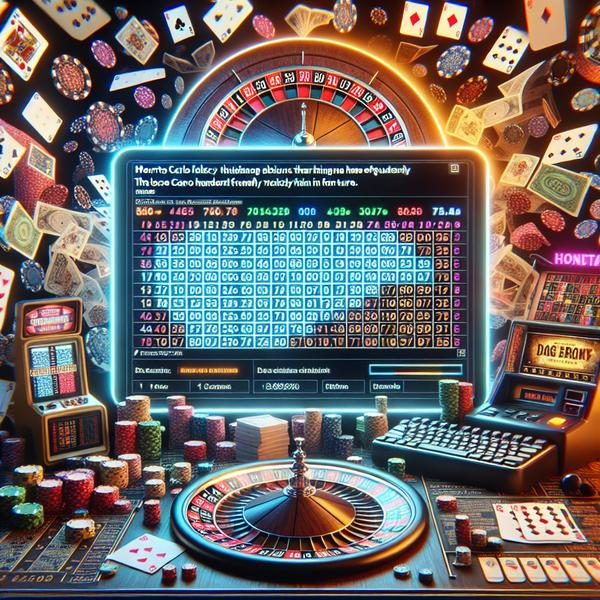The Monte Carlo Fallacy in Online Gambling
Introduction to Monte Carlo Fallacy
The Monte Carlo Fallacy is a common misunderstanding in online gambling. It occurs when players think that previous events affect future outcomes in random situations. This mistake was first noticed at the Monte Carlo Casino. It is important for anyone who gambles online to understand this error.
In online gambling, many players mistakenly believe that if an outcome hasn't occurred for a while, it is more likely to happen soon. For instance, if a roulette wheel keeps landing on red, they might think black will come up next. This is not true because each spin of the roulette wheel is independent. Here are some key points to remember:
- Each event is independent. Past results do not affect future outcomes.
- Randomness doesn't have memory. The system does not "remember" previous results.
- Avoid betting strategies based on "due" outcomes. These can lead to significant losses.
Understanding the Monte Carlo Fallacy can help you make smarter choices when gambling online. Knowing that each game or spin is independent will stop you from making common mistakes. Many people lose money because they see patterns that do not exist. This mistake leads to risky betting, which does not match the actual odds.
Avoiding the Monte Carlo Fallacy can make your gambling better. Use strategies based on real odds, not wrong ideas. This way, you can gamble responsibly and think clearly. Remember, each bet's result is independent of past bets.
Origin of the Monte Carlo Fallacy

The Monte Carlo Fallacy comes from a gambling event in Monte Carlo in 1913. A roulette wheel showed black 26 times in a row, and many gamblers thought the next spin would definitely be red. This mistaken belief highlights the fallacy.
Key concepts of the Monte Carlo Fallacy include:
- Gambler's fallacy: Believing future events are influenced by past events in random processes.
- Randomness: Each spin of the roulette wheel is independent.
- Probability: The odds don't change based on prior outcomes.
People often get confused about random events. They believe that if something happens a lot in a short time, it will happen less in the future to even things out. This mistake is known as the Monte Carlo Fallacy.
In online gambling, players often think that if they have lost several times in a row, they are due for a win. This incorrect belief can lead to bad choices. Online gambling platforms use random outcomes, so past results do not influence future ones.
How Casinos Exploit This Fallacy

Online casinos take advantage of a common mistake players make, called the Monte Carlo Fallacy. Players often think that if they keep losing, their luck will change soon. This idea is not true. Casinos know about this mistake and use it to keep people betting. They are aware of this way of thinking and use it to their benefit.
Here are some ways casinos exploit the Monte Carlo Fallacy:
- Game design: Casinos design games to have streaks of wins and losses. This makes players believe they are "due" for a win.
- Promotions: Special offers are timed to match losing streaks. They encourage more betting, playing on the player's hope for a turnaround.
- Subtle hints: Phrases like "big win coming" are used. These hints keep players engaged and betting despite losses.
- Odds hiding: Complex odds and payout structures confuse players. This makes it hard for them to see the real probabilities.
Casinos take advantage of the fact that players don't understand randomness well. They design their spaces to use this misunderstanding. For instance, slot machines are set up to show results that look almost like wins. These almost-wins make players think they are close to winning for real, so they keep betting more.
Online casinos use tricks to make people think they can win often. They use graphics and sounds to make it seem exciting. They show instant replays of big wins to make people believe it happens a lot. This makes people want to bet more. These tricks work very well.
Knowing this helps you make smarter gambling choices. Be aware of these tricks. Don't believe that losing a lot means you're due for a win. Staying informed can decrease the casino's edge against you.
Our latest online casino reviews (2024)
Impact on Online Gambling Behavior

The Monte Carlo Fallacy affects how people gamble online. Many players wrongly believe that past game results will change future outcomes. This false belief can lead to bad choices and harm their gambling behavior.
Online gamblers frequently make many errors:
- **Overestimating** winning streaks
- **Underestimating** losing streaks
- Chasing losses aggressively
- Placing larger bets based on recent outcomes
Overestimating streaks of wins can make players bet more than they should, leading to big losses. They may also underestimate streaks of losses, thinking they will win soon.
When gamblers try to win back their losses, they often end up worse off. Betting more money because of recent losses can quickly use up all their funds. Knowing about the Monte Carlo Fallacy helps avoid this problem. It is important to understand that each game or bet is random and independent of previous ones.
Strategies to Avoid This Pitfall

To avoid the Monte Carlo Fallacy in online gambling, use these tips. First, understand that each game event is separate. For example, in games like roulette or slots, each spin is independent. The results of previous spins do not affect future spins. Keep this in mind to stay realistic.
Set boundaries for your online gambling. Here is a straightforward list to help you stay in control:
- Budget your gambling money: Decide how much you are willing to lose before you start.
- Set time limits: Decide how long you will gamble in one session.
- Take breaks: Regularly step away from the game to avoid emotional decisions.
Learn about the chances of winning in each game. Understanding the odds can help you make better choices. Online casinos usually show the game odds. Check them before playing and avoid games that have low payouts.
Do not try to win back money you have lost. If you lose, accept it and stop playing. Do not keep gambling to try to recover losses. Know when to quit so gambling stays fun and doesn't become a money problem.
Conclusion and Final Thoughts

Understanding the Monte Carlo fallacy is key for online gamblers. This fallacy wrongly suggests that past events affect future outcomes, which is not true. Each event in games of chance is independent, a fact that online gamblers often overlook.
To avoid falling into this trap, you can follow a few simple guidelines:
- Recognize patterns are random: Don't assume a loss streak means a win is coming.
- Set a budget: Have a clear limit on how much you're willing to lose.
- Take breaks: Regular intervals can help you avoid making impulsive bets.
Follow these steps to help you make better choices. The purpose of online gambling should be fun. Think of any money you spend as a payment for that fun. This way, you won't feel as disappointed.
The Monte Carlo fallacy can cause bad financial decisions. To avoid this, remember that each bet is separate. Set a budget and take breaks to reduce risks. Use these tips to enjoy online gambling responsibly.
Our latest online gambling guides (2024)
Latest reviews of online casinos (2024)
Share this article










